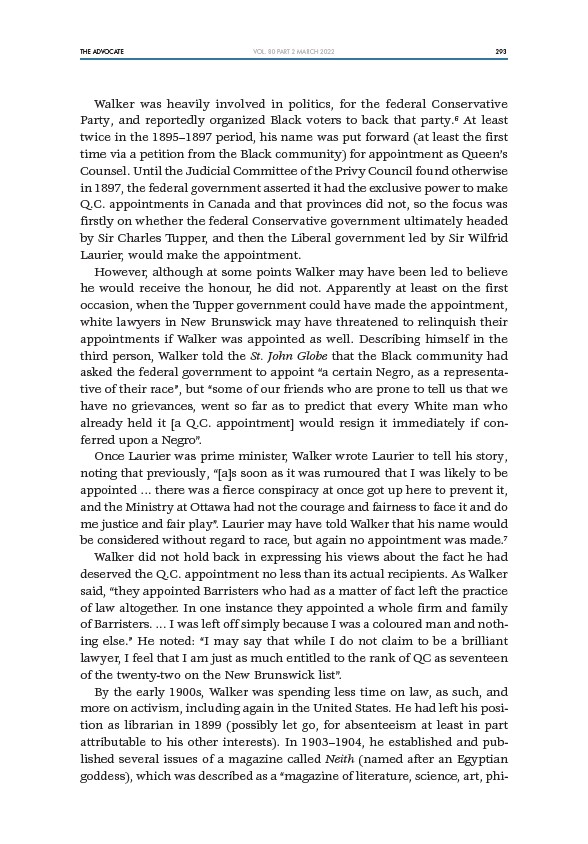
THE ADVOCATE 293
VOL. 80 PART 2 MARCH 2022
Walker was heavily involved in politics, for the federal Conservative
Party, and reportedly organized Black voters to back that party.6 At least
twice in the 1895–1897 period, his name was put forward (at least the first
time via a petition from the Black community) for appointment as Queen’s
Counsel. Until the Judicial Committee of the Privy Council found otherwise
in 1897, the federal government asserted it had the exclusive power to make
Q.C. appointments in Canada and that provinces did not, so the focus was
firstly on whether the federal Conservative government ultimately headed
by Sir Charles Tupper, and then the Liberal government led by Sir Wilfrid
Laurier, would make the appointment.
However, although at some points Walker may have been led to believe
he would receive the honour, he did not. Apparently at least on the first
occasion, when the Tupper government could have made the appointment,
white lawyers in New Brunswick may have threatened to relinquish their
appointments if Walker was appointed as well. Describing himself in the
third person, Walker told the St. John Globe that the Black community had
asked the federal government to appoint “a certain Negro, as a representative
of their race”, but “some of our friends who are prone to tell us that we
have no grievances, went so far as to predict that every White man who
already held it a Q.C. appointment would resign it immediately if conferred
upon a Negro”.
Once Laurier was prime minister, Walker wrote Laurier to tell his story,
noting that previously, “as soon as it was rumoured that I was likely to be
appointed … there was a fierce conspiracy at once got up here to prevent it,
and the Ministry at Ottawa had not the courage and fairness to face it and do
me justice and fair play”. Laurier may have told Walker that his name would
be considered without regard to race, but again no appointment was made.7
Walker did not hold back in expressing his views about the fact he had
deserved the Q.C. appointment no less than its actual recipients. As Walker
said, “they appointed Barristers who had as a matter of fact left the practice
of law altogether. In one instance they appointed a whole firm and family
of Barristers. … I was left off simply because I was a coloured man and nothing
else.” He noted: “I may say that while I do not claim to be a brilliant
lawyer, I feel that I am just as much entitled to the rank of QC as seventeen
of the twenty-two on the New Brunswick list”.
By the early 1900s, Walker was spending less time on law, as such, and
more on activism, including again in the United States. He had left his position
as librarian in 1899 (possibly let go, for absenteeism at least in part
attributable to his other interests). In 1903–1904, he established and published
several issues of a magazine called Neith (named after an Egyptian
goddess), which was described as a “magazine of literature, science, art, phi-